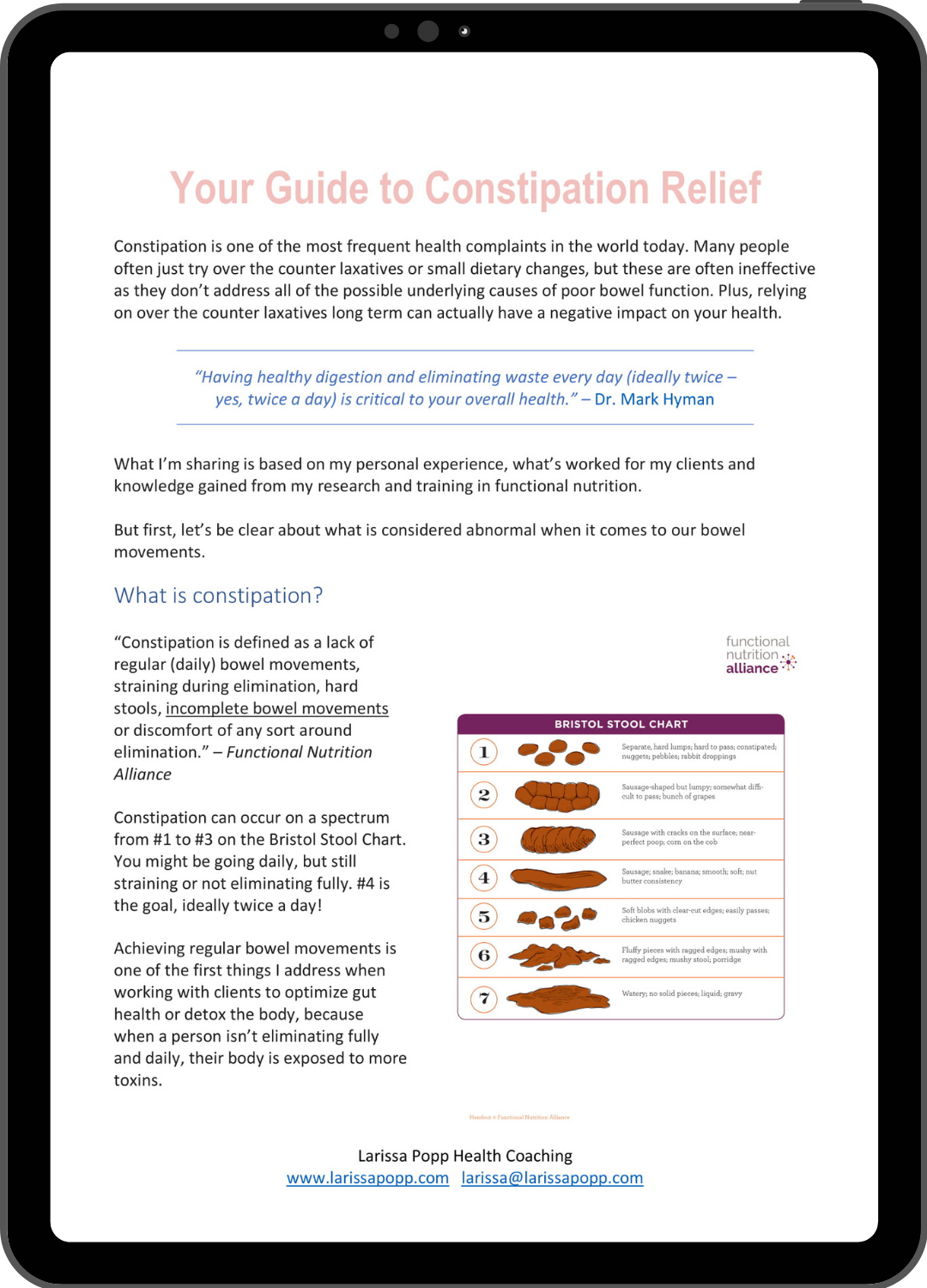I think a lot of women accept common symptoms such as low energy and brain fog as simply a result of being over-worked or as an inevitable part of hormonal changes or getting older, or they don’t think there is any easy solution.
This is why testing is so important!
You might not know that the symptoms you’re experiencing, or just the way that you’re feeling could be linked to nutrient deficiencies that could be easily resolved, such as iron or B12 deficiency which a both critical for energy and brain functioning.
One of the frameworks I use when working with clients is called the 3 Tiers of Nutrition Mastery, and the second tier is all about uncovering and addressing nutritional deficiencies. Regardless of what symptoms you may be presenting with, its critical to ensure your body has the nutrients it needs to function optimally.
There continues to be a great deal of debate and confusion about what in fact is the healthiest diet to create health, maintain health and develop a really robust gut microbiome and a functional immune system. I think we can’t argue that eating real foods is always better than eating processed “foods” but beyond that there is no one perfect diet for everyone – I work with my clients to help them discover the best diet that works for their unique body right now.
If you want to know if your diet is working for you, it’s best to test not guess!
While nutrient sufficiency can often be achieved by simply switching to a nutrient-rich whole foods diet and optimizing digestion and gut health, I recommend having standard bloodwork done at least once a year as a good insurance policy if your goal is optimal health, vitality and disease-prevention.
Unfortunately, you can’t rely on your doctor to run all the right tests to catch early signs of deficiencies or dysfunction in the body. This is why I say you need to be the CEO of your own health.
I give my clients a “Labs Wishlist” to take to their doctor – it’s the same one my mentor, Andrea Nakayama uses with clients in her clinic. They always come back to me and say that their doctor won’t run many of the requested labs because they don’t think they need them. Doctors often run only the absolute minimum because that’s all that insurance companies are willing to pay for.
Unfortunately, the U.S. healthcare system is flawed, and I won’t get into that in this blog – lots of wonderful life-saving advances and good intentioned doctors doing the best they can within the current system, but I believe functional medicine is the future of true healthcare.
Fortunately, you can request labs yourself online – yes, you may have to pay out of pocket, but the standard lab work I’m recommending isn’t that expensive to run once a year and can actually save you a lot of money in the long-run – as you won’t waste money on unnecessary, ineffective supplements, and you’ll avoid the cost of doctor visits and other medical costs in the future as a result of nutritional deficiencies that went undetected until things got worse. If you want to see the Labs Wishlist that I use, just go to www.directlabs.com, click “order now,” search for “FxNA” and see the basic panel.
I use the results of these labs, in tandem with a client’s symptoms and health history to determine whether additional testing may be helpful in identifying root causes and to inform personalized recommendations.
One of the good things about living in Turkey is that I can just go directly to a laboratory and request the tests I want – it’s quite inexpensive and I have results the next day! So, if you want to visit Turkey – which is a popular medical destination for hair implants as well – you can get your labs run while visiting. I’d love to have you visit me as well here in Alanya!
What would it be worth for you to just feel incredible? Full of energy, super focused and productive at work, pain-free, have clear and youthful looking skin, and a well-functioning immune system that keeps you from getting sick?
I think investing in your health is the best investment we can make! Do you agree??
A lot of people brush off symptoms as “normal” just because they are so “common” such as headaches, feeling tired, PMS, irritability, anxiety, etc. Or they think that it’s just a result of getting older.
You really have to pay attention to even subtle signals your body is giving you to let you know that something is off so that you can address the root causes(s) before symptoms worsen and you put yourself at risk for more complications in the body.
For example, having sub-optimal levels of key nutrients such as your B vitamin, Vitamin D, magnesium, iron and/or zinc – which are all so common these days — has a big impact on your energy, mood, cognition, immune function, and much more!
Let me share a personal store here…
I recently had some bloodwork done, not because of any problem I had, but just for a check-up, and I found out that I have low ferritin (well below the optimal range) and slightly low hemoglobin. Ferritin is the storage form of iron. Based on how I was feeling I never would have suspected an iron deficiency, and this is likely not a test my doctor would have run since I wasn’t presenting with obvious symptoms of iron deficiency like extreme fatigue, weakness, pale skin, heart palpitations, shortness of breath, headaches, dizziness, etc.
However, after I got my results and looked at the full list of possible symptoms associated with iron deficiency I realized I did have some signs, such as cold hands and feet, brittle nails, occasional lightheadedness, irritability, difficulty concentrating, and hair loss (more hair coming out when brushing or washing it). And I realized that perhaps my energy wasn’t what it SHOULD be, but I had just gotten used to it. And perhaps my struggle with concentrating wasn’t all in my head! Now that I’m working on increasing my iron I suddenly find it much easier to go for a run – it feels like I’m flying compared to before. In fact, I found this article that talked about he association between low iron and runner’s performance. I’ve also noticed that my concentration and mood have improved!
Now, I haven’t re-tested yet (I plan to do it after 3 months), so after I do I’ll write a blog post to share my results and talk about what I did to increase my levels, and what things you need to consider – it’s not always as simple as increasing meat intake or taking an iron supplement – optimizing iron absorption is key!
Oh, and low iron can also lead to hypothyroidism, which I also found out I have from my blood work!
According to Dr. Jolene Brighten, Functional Medicine Naturopathic Physician specializing in the treatment of hormone disorders, “checking iron status is at the top of the list in women who have heavy periods, fatigue, hypothyroidism, or hair loss.” (Learn more: Hypothyroidism & Iron Deficiency + 4 Steps to Boost Iron)
I’ll talk about my thyroid test results in a separate blog post but just know that if you’re a woman, it’s important to test not only TSH (thyroid stimulating hormone), but have a full thyroid panel that includes thyroid antibodies to rule out hypothyroidism and Hashimoto’s (an autoimmune condition that is the cause of 90% of hypothyroid cases). Most conventional doctors will only test TSH, but it’s possible to have normal TSH but sub-optimal levels of Free T4 and/or free T3 and the presence of thyroid antibodies; using TSH as the only marker of thyroid health if very inadequate and leads to many cases of hypothyroidism going undetected for a long time until they become much worse. If you have symptoms of hypothyroidism request a full thyroid panel, and if your doctor won’t run it, you can order for yourself via Directlabs. (Learn more: Why I Require a Full Thyroid Panel and Your Doctor Should Too)
The other important nutrient everyone should test at least twice a year is Vitamin D. Vitamin D is actually a hormone and it regulates our calcium level and bone density, supports the immune system, reduces inflammation, and has a big impact on overall health!
I live in in the south of Turkey by the beach and we have lots of sun, and while I don’t spend a ton of time at the beach in the afternoon, I thought I was getting a good amount of sun exposure without sunscreen. Plus, I was supplementing with Vitamin D (not consistently, but enough that I expected to have higher levels). My vitamin D level was low at only 29. Hence why you want to test not guess!
According to Dr. Mark Hyman, the optimal level for Vitamin D is between 50-80 ng/ml. I’m now intentionally sunbathing on my balcony for 20 minutes in the afternoon, and when I don’t I take 4,000 IU of Vitamin D. You can use this Vitamin D calculator to see how much you need.
I will re-test again after 3 months to see how I’m doing. If you re-test and your level hasn’t increased much, you could have an absorption issue. This is why so much of my work with clients is focus on digestion and optimizing nutrient absorption in the body as I think it’s a big reason for so many nutrient deficiencies these days!
When I work with clients I actually take the time to educate them on how to read and interpret their own bloodwork from a functional medicine perspective, using optimal lab ranges. One of my goals is to empower my clients with the right knowledge to have an informed conversation with their doctor about their health – knowing the right questions to ask, and knowing when it’s time to find a new doctor.
Another inexpensive and very useful tool for uncovering nutrient deficiencies is Hair Tissue Mineral Analysis (HTMA). If you’ve had bloodwork, tried supplementing and you’re still feeling tired, struggling with focus, and feeling irritable or anxious all the time — HTMA is a great test to do. However, you can’t read it at face value — its only useful if you have someone who knows how to interpret the patterns. And you’re in luck! I have just added this to the list of functional testing that I can offer interpretation of (along with the GI MAP and Organic Acid Testing). I am currently going through an HTMA Expert training course (as of December 2021) so starting January 2022 I’ll be offering a special HTMA test + protocol and support package.
If you would like to know which of these tests is the best next step for you in uncovering potential nutrient deficiencies, schedule a free discovery call with me here.
If you already know that you want to do


